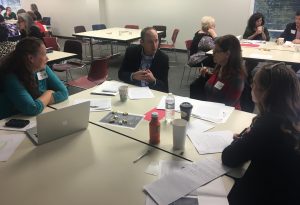Internships are a hot topic on both college campuses and in employers’ offices. Students have the chance to put classroom learning to use in real-life scenarios, and employers – private, public, and nonprofit – can build a talent pipeline. On Friday, October 20, nearly 50 employers, faculty, and staff gathered at Birmingham-Southern College for Internships that Work.
So what makes internships work? Here are five great ideas from the day:
1. Put students in charge of their own learning.
Student learning is the primary purposes of academic internships. That means students bear the responsibility for making their internships successful.
2. Formalize the job description.
Internships are not service or volunteer opportunities, and they need job descriptions to build a foundation for the internship relationship. The most effective job descriptions include:
• organization description/mission
• internship title with key search terms
• desired start date
• hours per week – including whether this is negotiable
• paid or unpaid
• job duties (e.g., create social media content)
• learning opportunities (e.g., SEO and Google analytics)
• qualifications and skills
• application information, including how long it will take you to respond
3. Develop a learning plan
The learning plan helps students clarify their goals and the steps needed to achieve them. It also helps define employers’ and professors’ expectations. The best learning plans challenge student learning, serve as a roadmap for supervision and evaluation, and give a starting point for reflection.
4. Provide structured supervision
Supervision is an ongoing process where faculty, employers, and even peers ask learners to reflect, challenge their assumptions, test theories, and make connections across different sites of learning. A best practice is for students to take the lead in their own supervision within an agreed-upon framework, including preparing the meeting agenda. That agenda, written in advance, can include a review of their projects, something they have learned, something they have a question about, and something they would like to do to reach their goals.
5. Communication matters.
All of this takes effective communication skills. Integrative communication is a specific strategy to improve communications between students, educators, and employers. Integrative communication combines advocacy and inquiry. Advocacy means saying what we think, know, want or feel. Inquiry seeks to learn what others think, know, want, or feel. Integrating advocacy and inquiry most likely results in improved relationships, better decision-making, and improved group learning and problem-solving.
Alabama Possible’s Higher Education Alliance and the Krulak Institute for Leadership, Experiential Learning, and Civic Engagement co-sponsored the workshop.
Here are links to workshop resources:
Workshop PowerPoint including poll results
Participant list
Integrative communication advocacy and inquiry
Unpaid internships: regulations and rulings
Internship bill of rights and responsibilities
Sample supervisor evaluation of intern
Sample internship learning plan and agreement form
Case studies and completed chart
Thank you for an excellent workshop, presentation, hand-outs & follow-up resources.
I sincerely enjoyed the workshop and appreciate all of these resources. FYI, the case studies is not loaded, it goes to the internship bill of rights instead.